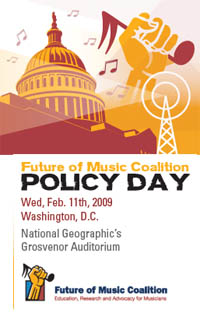
Being a fan of minimalist repetition and experimental music, you’d think I could handle the overloaded information loop that is Headline News, but l even had to skip my normal morning dose of NPR this a.m. because the local station is in on-message telethon mode. I get that it’s time to cough up the voluntary subscription price, but why is it kosher to whine for it with all the determination of a four year old in a grocery store? Seriously, is this the best way to attract the dollars of the hybrid-driving, latte-drinking intellectual elite?
And lord help us if newspapers decide to go this route. I don’t think Walter Isaacson, who’s been getting a lot of press play in recent weeks, really has it figured out either. He brings up some salient points, however, and I see a lot of parallels to figuring out optimum new business models for music, so it seems like it’s worth some study. (For those who like their content with moving picture, Isaacson chatted with Jon Stewart about his ideas here.) As with many things, there are plenty of other proposals for solving the crisis on the table, and the answer is probably not a one-size-fits-all solution.
I know subscription models like TimesSelect failed, but I can still see paying yearly modest subscription fees for access to sites I already visit as a matter of daily procrastination routine. Maybe there’s always a guest pass for low volume users (First five articles absolutely free! Well, except for the advertising we’re going to make you watch.) and then a monthly/yearly charge once you’re hooked and are motivated to kick in? Kind of like Rhapsody. That way, it’s all about access, but there’s an appropriate motivating hook already embedded: the content itself. We’re already trained to pay $1.99 if we want to watch otherwise freely available network T.V. without wasting time on advertising, so it might not be such a stretch.
Or maybe we should go the telethon route. Maybe at the end of the day, annoying people is the fastest way into their wallets. I probably best respond to threats, however, so I’ll leave you with this: If newspapers fail, we may be left to get all our news from Tweets.
*image courtesy SoundsLikeNow

